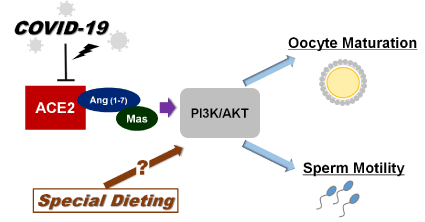Dear Editor,
COVID-19 easily might enter the host cells by attaching to angiotensin-converting enzyme-2 (ACE2) that is expressed on pneumocytes of the host airways. Several data have shown a host-protective role of the ACE2 pathway. Surface spike glycoprotein on the surface of COVID-19 binds to the ACE2 protein. Then, COVID-19 infection develops severe due to high viral load with destroying pneumocytes and/or the ACE2 protection pathway.Expression of ACE2 in the ovaries and testes suggests that this enzyme affects germ cells and reproductive health. The Ang (1–7) produced by ACE2 exerts its effects through Mas receptor, which modulate the ovarian physiological functions such as follicular development, oocyte maturation, ovulation [1]. The ACE2/Ang-(1–7)/Mas axis may also promote meiotic resumption [2]. In the male reproductive tract, ACE2 is selectively expressed by adult Leydig cells in the testis, where the ACE2/Ang-(1–7)/Mas axis may activate sperm motility via the PI3K/AKT pathway [3]. In general, the ACE2/ Ang (1–7)/Mas activates PI3K/AKT signaling, and the PI3K/AKT signaling is thought to correlate with host-protection in several diseases by ameliorating oxidative stress and inflammation.
For fear that COVID-19 virus terminates the ACE2/ Ang (1–7)/Mas/PI3K/AKT pathway, a host protection and fertility-system, it would be of significance to define appropriate strategies to activate the PI3K/AKT pathway (Figure 1). As the efficiency of pharmacological and/or vaccinal managements against COVID-19 has been unsatisfactory at present, dietary choices could indicate a certain role via the PI3K/AKT signaling-activation [4]. Lifestyle factors such as the special diets could play certain roles against possible infertility of COVID-19.

Figure 1. Schematic illustration implying that COVID-19 infection may induce infertility, as ACE2/Ang(17)/Mas/PI3K/AKT activation-axis stimulates oocyte matumation and/or sperm motility. When COVID-19 infection abolishes the ACE2 axis, special dieting could substitute the stimulation by activating the PI3K/AKT signaling
Nil.
There are no conflicts of interest.
- Costa AP, Fagundes-Moura CR, Pereira VM, Silva LF, Vieira MA, et al. (2003) Angiotensin-(1–7): A novel peptide in the ovary. Endocrinology 144: 1942-1948. [Crossref]
- Honorato-Sampaio K1, Pereira VM, Santos RA, Reis AM (2012) Evidence that angiotensin-(1-7) is an intermediate of gonadotrophin-induced oocyte maturation in the rat preovulatory follicle. Exp Physiol 97: 642-650. [Crossref]
- Valdivia A, Cortés L, Beitia M, Totorikaguena L, Agirregoitia N, et al. (2020) Role of Angiotensin-(1-7) via MAS receptor in human sperm motility and acrosome reaction. Reproduction 159: 241-249.
- Kitagishi Y, Nakanishi A, Ogura Y, Matsuda S (2014) Dietary regulation of PI3K/AKT/GSK-3β pathway in Alzheimer's disease. Alzheimers Res Ther 6: 35.
Editorial Information
Editor-in-Chief
John Livingston Powell
University of North Carolina School of Medicine
USA
Article Type
Letter to Editor
Publication history
Received date: May 01, 2020
Accepted date: May 05, 2020
Published date: May 11, 2020
Copyright
©2020 Tsuji A. This is an open-access article distributed under the terms of the Creative Commons Attribution License, which permits unrestricted use, distribution, and reproduction in any medium, provided the original author and source are credited.
Citation
Tsuji A, Ikeda Y, Murakami M, Matsuda S (2020) COVID-19, an infertility risk? Clin Obstet Gynecol Reprod Med 6: DOI: 10.15761/COGRM.1000291
Corresponding author
Satoru Matsuda
Department of Food Science and Nutrition, Nara Women's University, Kita-Uoya Nishimachi, Nara 630-8506, Japan
E-mail : bhuvaneswari.bibleraaj@uhsm.nhs.uk

